- Home
- Neal Asher
Infinity Engine Page 4
Infinity Engine Read online
Page 4
“To say I’m beginning to have second thoughts about this is an understatement,” said Sepia.
“Yes,” said Trent, noncommittally.
Finally, the victor lost interest in them, launched itself up to the ceiling and disappeared through a hatch there. The injured robot meanwhile had finally managed to snag a limb against one wall, where it pulled itself flat.
“Come on,” said Trent.
They moved quickly underneath the hatch, warily past the now motionless maintenance-bot. Surely this kind of activity couldn’t be common, thought Trent, or else, after a hundred years there would have been nothing here but wreckage. He was sure now that something new was occurring.
“Did you see that?” said Cole. “It was after data.”
Trent chewed that over as they rounded one more corner and came upon yet another of the denizens of this strange world.
Here a tic-shaped printer-bot was slowly and meticulously blocking off the way ahead, the numerous jointed printing heads sprouting from its foreparts steadily depositing layers of some white crystalline substance round and round the tunnel’s interior. Trent was reminded of a paper wasp building its nest, and as he eyed those busy printing heads he wondered if they were capable of doing any damage. Perhaps it would be better just to hit the thing now . . . He raised his particle cannon, at which point the robot abruptly retreated out of sight.
“I’ll go first,” he said.
He moved up to the barrier which, running round the walls of the tunnel, had left a hole a couple of yards across. Ducking his head through, he looked around. The printer-bot had moved back along the tunnel and now sat in a small alcove twenty feet in, its limb heads splayed in front of it as if for protection. Trent ripped his boot soles from the floor, propelled himself through the part-made barrier and pushed down onto the floor on the other side.
“Okay, come on,” he called over suit radio.
He moved forwards to stand directly opposite the bot as the other two came through. “Just move past behind me,” he instructed.
The bot made no threatening moves and finally Trent hurried to catch up with the other two. When he reached them and glanced back he saw that the bot had returned to work. He knew that such robots possessed some programming lifted directly from the minds of social insects and wondered what the thing thought it was, or if it was doing any thinking at all.
The tunnel brought them to an inactive dropshaft which, with grav off, they traversed as they had the tunnel. Another tunnel then brought them to a maglev station, in which sat a row of pod carriages, each capable of holding up to ten people.
“This could take us right there, if it was operating,” said Sepia.
“It might be,” said Trent, noting that screen paint maps and information displays were powered up on some pillars.
“Should we trust it?” she wondered.
“Let’s find out.” He slapped a hand against the weapon he held. “I can certainly shut a carriage down if it seems out of control.”
They approached one of the carriages, and doors in its side immediately slid open. Trent stepped inside first with the other two pushing in close behind him for fear that the doors would close and leave them stranded. The doors shut once they were well inside and the carriage shifted smoothly into motion as they sat. Sepia, studying a station map above the windows, reached up and pressed a finger against one station. It highlighted briefly then went out. After a moment she shrugged and sat down.
The trip was fast, the only concern being when the carriage slowed for a moment to grate past a section of wall that had been dented in. All the while Trent kept his weapon pointed at a section of floor towards the front. One shot there should knock out the inducer plates, which would drop the train down on its single track, whereupon simple nano-mesh braking would ensue. But there was no need. The carriage pulled up neatly at the required station and a moment later they were outside.
Human-sized tunnels leading from the maglev station had all been closed by emergency airlocks. Sepia struggled with then finally opened the outer door on the one they wanted and Trent stepped inside—it was only big enough to take one person. The manual controls, which were standard in an emergency lock like this, were all operating, and an indicator informed him that the lock was charging with air. When it reached optimum he used the manual handle to open the inner door and stepped through, feeling half an Earth gravity take hold of him. After checking his head-up display he instructed his visor to open. It sucked down into the front of his neck ring and his helmet folded down into the back. He smelled burning as he took a few paces forwards on carpet moss that coated the floor leading into a reception area. Here sub-AI gurneys sat in a stack, while on the floor lay three human skeletons still clad in cleansuits that might once have been white, the floor pristine around them because the carpet moss had fed on the products of their decay.
“I wonder how they died,” said Sepia from behind.
“Probably how most of the human personnel died here,” Trent replied. “They either took their own lives or boiled.”
From the reception area numerous corridors speared off into the distance. After checking the signs above these, Trent stepped into one and headed to the first entryway which was without a door. He stepped through, micro UV lasers flashing around him and frying any bugs he might have carried on the exterior of his suit, his face tingling as microscopic fauna was selectively destroyed there. Inside, arrays of surgical robots stood poised as if on a production line, the channel between without grav-plates but with the small heads of hardfield projectors protruding. The wounded, stabilized by field autodocs, would have been fed in here.
He switched his gaze from the robots to the carousels sitting behind them—revolving drums like children’s roundabouts stacked one on top of the other. Here he could see the panoply of Polity medical science of the time. Here were nanoform wound dressings, canisters of liquid bone, collagen and other materials to feed the printing heads of bone and cell welders, artificial blood, reels of syntheskin and shaped gobbets of syntheflesh, other items that utterly baffled him, and still others that were easily recognizable: hands and feet, arms and legs, skulls and ribs—all motorized, all with nerve interface sockets and all formed of polished ceramal. All unused, yet meticulously cleaned and maintained over the last hundred years.
Out of the other end of this would step human beings who had been repaired like crashed gravcars, ready for the next stages of their treatment, whereupon they could pull on new uniforms, exoskeletons or camo-combats and return to the meat grinder that was the war against the prador.
“It looks very clean,” said Sepia. “It could have been abandoned yesterday.”
“This is what we were looking for,” said Trent.
“Not all of it,” said Cole. “I want to see what’s up the other end.”
At this point one of the robots, a thing like a steel cockroach, sans its abdomen and standing upright at nearly nine feet tall, turned its nightmare head towards them.
“We’ll go round,” Trent suggested.
Sepia nodded and led the way out and further up the corridor. Another delousing arch led them into an area like a huge runcible lounge. Cole took the lead next, heading straight for one of a series of closed doors. The room contained a comfortable adjustable chair sporting padded straps. The headrest looked like a steel cockle, packed inside with intricate electronics and the heads of nano-fibre aug interfaces.
“So this is what an editing suite looks like,” said Trent.
“This is it,” Cole agreed, his expression maniacally eager. “This is what we need.”
Trent nodded. Yes, here was where they could take the shell people to bring them out of hibernation. Here they could repair their physical injuries and here Cole could try, if Trent allowed him, to repair the madness between their ears. Here too Trent could wake up Reece and, if he dared, ask her w
hy she had chosen hibernation rather than his company.
They stepped out of the suite just as the door at the end of the corridor banged open. The nine-foot-tall surgical robot they had seen earlier had not been as rooted to the floor as Trent had supposed, but walked on wide flat feet like the most horrifying clown imaginable.
“This,” it said, “is private property.”
Riss
The first three had been easy, their defences only formatted against the kind of attacks they could expect from their neighbours, which consisted of computer viral incursions and brute robotic assault. They were unprepared for the likes of Riss. Not only were they a hundred years out of date, they had regressed.
Riss had been reluctant to do her duty with the first AI, until she began running subtle penetrations of its systems, data caches, robots and occasional crippled subminds—those additional subordinate minds some AIs possessed. The thing wasn’t much more intelligent than the average human, but what was wrong with it was difficult to nail down in human terms. Certainly it was paranoid, but then it had good reason to be. Certainly it was psychotic, since it had lost all contact with any reality lying beyond this station. And definitely it was a vicious killer of any other AI it could overcome. It could be cured, of course, but Riss’s investigations revealed that very little would remain after that cure. In fact, it wasn’t much different from the prador . . .
Running the same penetrations on the other two AIs, Riss found the same mindset, and now, as she approached this last AI’s hideaway, she wondered why she was looking. She was an assassin drone with a mission to accomplish. She wasn’t a mind-tech. Why was she searching for justifications?
“Because you have a conscience,” said the tac-AI.
What?
“Be assured,” continued that distant AI, “that what you are doing is necessary. Destroy this last AI and the instability here caused by the attack from the King’s Guard, then Penny Royal will tip over into complete chaos.”
King’s Guard? Penny Royal?
“I don’t understand,” said Riss.
“Just do your duty.”
Riss moved on through the ceramic pipework once used to convey molten metals to component moulds and deposition heads. Scanning through the ceramic, she saw the constructor spiders blocking the main entrances to this AI’s realm. They were completely unaware of her as she slid along smoothly, following the pipe through an armoured wall, then out through a maze of pipework to a reheating tank. The tank lay behind a machine used for making armour with single-atom-thick laminations. She then contracted and extended her form until she was as thin as a human finger so she could enter a flexible silicon-corundum-fibre pipe behind a series of deposition heads. Here she vibrated her nose at high frequency and pushed, parting the corundum fibres and stretching the high-temperature silicon. A small slice with the chain-glass blade along the edge of one of her small limbs split the silicon and she shot out, immediately engaging her chameleonware, curled round and came back down on the cowling of the laminating machine. She looked around.
Like iron prador with the guts of solar water heaters protruding from their faces, five of the machines squatted in a row over ceramic moulds with the appearance of giant leaf sculptures. On the opposite side of this area armour plates in all sorts of organic shapes were stacked up into a wall, oddly covered with what looked to be cobwebs. But this couldn’t be, unless spiders had evolved to survive in vacuum. Riss scanned closer and recognized the product of rogue nano-machines. Those fibres were whiskers of metal woven out from the armour and as fragile as frost. To Riss’s left stood an armoured door and to the right was the AI.
The AI was of the usual design—a crystal the size and shape of a house brick laced through with quantum computing and wrapped in a skeleton of ceramal—however, it wasn’t supported between the splayed heads of data-shunts. Riss noted that it had a chunk missing from its side, sapphire-filled cracks throughout, and subsidiary computing in the form of carbon stick processors jury-rigged by a skein of optics. It sat in a loco-body: a cup-shaped frame over laminar power storage, torque motors and two long heron-like legs. Obviously it had found movement a useful survival trait, but it was one that wouldn’t help it now.
“It seems . . . unfair,” said Riss.
“As unfair as killing a prador that meant you no harm?” asked the tac-AI.
This left Riss somewhat puzzled. What was the likelihood of anyone meeting a prador that meant no harm? She shrugged it off. This wasn’t the time for agonizing about what she was doing, but it was time for just doing.
She slithered down from the machine and across the floor to the foot of the AI. Surprisingly, it reacted, straightening out its legs then taking a pace out onto the floor, coming close to stepping on Riss with one of its big, three-toed feet.
“Who’s there?” it asked over a human suit com frequency.
This reaction was surprising. None of the other three had any idea that Riss was there before she’d destroyed them. None of them, in any of their communications, had used human speech. So why was this one . . . ? Then Riss saw it.
Behind the AI, against the base of the wall, lay a pile of five space suits. Scanning these, Riss found the vacuum-dried human remains inside, and further scanning revealed how they had died. Riss turned to gaze over at the laminating machines and wondered how it was done. Every space suit had two holes through its helmet, almost certainly made by a cutting laser, but one which had deliberately not cut through the underlying skull. Silicon plugs scattered about the base of one of the machines showed that the holes had been sealed with plugs to prevent air loss. Just after the holes were made, and sealed, each of these people in turn was manoeuvred below a deposition head, whereupon one plug was removed and high-temperature etching fluid was sprayed inside. This was an ablating spray that had boiled away skin, flesh and fat, and which then exited as vapour through the second hole, after the added pressure had blown out the plug there. After that, vaporized gold was sprayed in to evenly coat the exposed skull. Why?
They had been alive when the etching fluid had been sprayed in, but whether they were still alive when their skulls were coated with gold was debatable. Whatever—they had died an agonizing death.
“Why did you do it?” asked Riss over suit com.
“Bastable?” asked the AI.
“Why did you choose to kill the humans in the way you did?” asked Riss.
“Bastable?” the AI queried again.
Further scanning of a suit ID tag revealed that one of the victims had been called Erica Bastable. As Riss learned this, a door at the end of the room opened and in swarmed three spiderbots on the ends of their umbilicals, chain-glass mandibles rubbing together, but utterly silent in vacuum.
“I am not Bastable,” said Riss, “and I want to know why you killed these humans in such a cruel and seemingly pointless manner.”
“It was their fault,” said the AI.
“What was their fault?” Riss slithered about the AI’s feet as it moved further out onto the floor, trying to locate her.
“The war, Room 101 . . .”
“You’re making no sense.”
“They had to know the pain, then oblivion.”
Riss moved aside and gazed up at the AI. What was the point in arguing? The humans didn’t start the war, the prador did, and the humans were really just minor participants in a conflict between the AIs and the prador. Here it was simply a case of the madness of Room 101 infecting one of its subordinates and, really, there was only one cure. Riss shot forwards, stuck the bottom of her hood against the loco’s upper leg, whipped her ovipositor up and deposited four blobs of gel on the AI’s crystal, then dropped away. She slithered then at high speed underneath the spiderbots, came to the doorway and paused, rising up the wall beside the door to watch as she sent the signal.
A flash ensued, bright as the glare of the hypergiant
, only distinguishable as issuing from four points by the acute drone senses Riss possessed. In eerie silence a ball of fire erupted, picking up the spiderbots and hurling them cartwheeling back through the door, segments of armour tumbling like the leaves they resembled. She stuck in place, waiting for the blast to pass, watching fire elementals writhe and self-consume, then wink out in vacuum, and trillions of fragments of AI crystal glittering like ice. The entire upper section of the AI was gone, yet, oddly, its two legs remained in place like comedy boots, gecko-stuck to the floor. Riss unstuck herself from the wall and moved away, circumventing spiderbots that now seemed as dead as their controlling AI.
“Now your chores are completed,” said the tac-AI, “it’s time for you to remember.”
“What?” said Riss.
“You were very badly damaged, Riss, so it was easy to put the blocks in.”
“Remember?” said Riss.
“The key words are: Thorvald Spear,” said the AI.
The memories came back in one mass, instantly comprehended. Riss found herself coiled tightly on the floor, but just for a moment. She shot up, strengthening her defences and, running internal diagnostics, tried to run a signal trace on that “tac-AI” even as it severed the link, cursed and hissed silently in vacuum. One of the damned station AIs had taken control of her to rid itself of some rivals. Damn it, she could try hunting it down but knew her chances of locating it now were random. What she needed to do was get out of this place, and the route out of here was those key words.
Thorvald Spear. She had to find him.
A Prelude: Penny Royal
“The dreadnought is our target,” states the AI of the Vorpal Dagger, the massive lozenge-shaped dreadnought in command of the attack on prador forces here around Layden’s Sink black hole. This is AI communication, however, so no human words are used and the message comes laden with tactical information that loads with it. The Vorpal Dagger and two other Polity dreadnoughts will lead the attack. Smaller ships, like a shoal of cubist fish, will cover them, while the Vorpal Dagger deploys their main weapon.

 The Bosch: A Novella (Polity Universe)
The Bosch: A Novella (Polity Universe)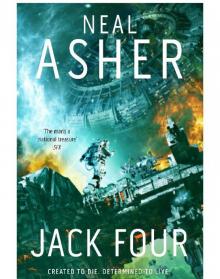 Jack Four
Jack Four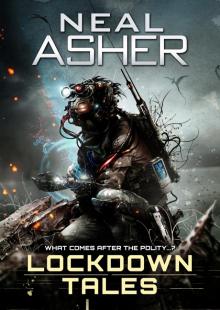 Lockdown Tales
Lockdown Tales The Warship
The Warship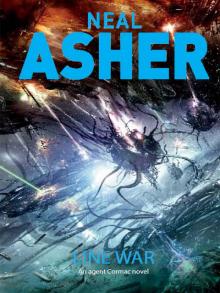 Line War
Line War Total Conflict
Total Conflict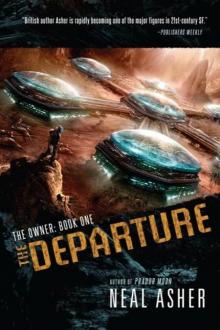 The Departure
The Departure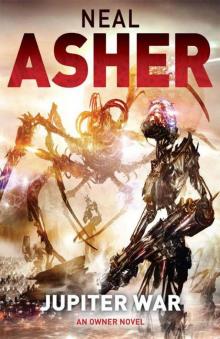 Owner 03 - Jupiter War
Owner 03 - Jupiter War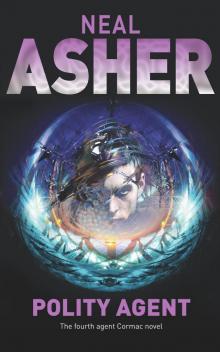 Polity Agent
Polity Agent Prador Moon
Prador Moon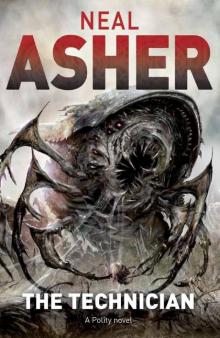 The Technician
The Technician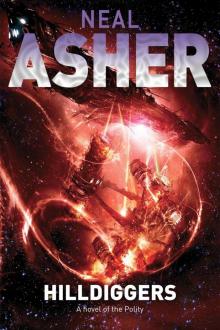 Hilldiggers
Hilldiggers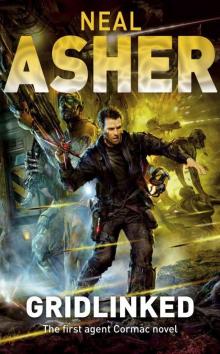 Gridlinked
Gridlinked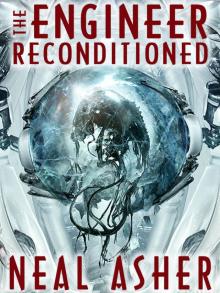 The Engineer ReConditioned
The Engineer ReConditioned Dark Intelligence
Dark Intelligence The Soldier: Rise of the Jain, Book One
The Soldier: Rise of the Jain, Book One Shadow of the Scorpion p-2
Shadow of the Scorpion p-2 The Skinner
The Skinner The Soldier
The Soldier The Gabble p-13
The Gabble p-13 The Gabble and Other Stories
The Gabble and Other Stories The Parasite
The Parasite The Other Gun
The Other Gun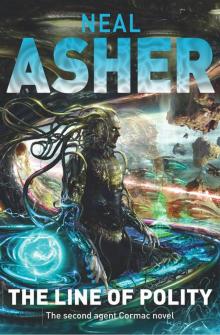 The Line of Polity
The Line of Polity Zero Point (Owner Trilogy 2)
Zero Point (Owner Trilogy 2)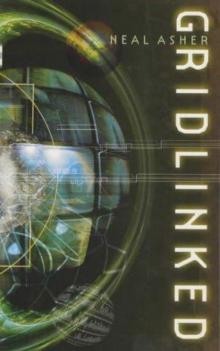 Gridlinked ac-1
Gridlinked ac-1 Prador Moon p-1
Prador Moon p-1 Infinity Engine
Infinity Engine Mindgames: Fool's Mate
Mindgames: Fool's Mate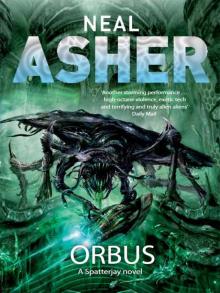 Orbus
Orbus Africa Zero
Africa Zero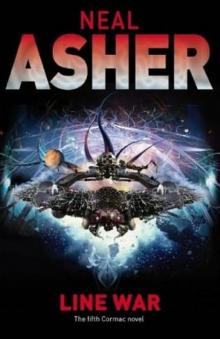 Line War ac-5
Line War ac-5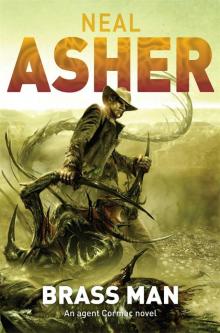 Brass Man
Brass Man The Departure to-1
The Departure to-1 Cowl
Cowl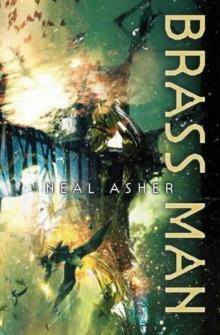 Brass Man ac-3
Brass Man ac-3 Hilldiggers (polity)
Hilldiggers (polity)![Greg Bear - [Eon Trilogy 1] - Eon (rescan) (v1.0) Read online](http://i1.bookreadfree.com/i2/04/08/greg_bear_-_eon_trilogy_1_-_eon_rescan_v1_0_preview.jpg) Greg Bear - [Eon Trilogy 1] - Eon (rescan) (v1.0)
Greg Bear - [Eon Trilogy 1] - Eon (rescan) (v1.0) The Skinner s-1
The Skinner s-1 The Voyage of the Sable Keech s-2
The Voyage of the Sable Keech s-2 The Line of Polity ac-2
The Line of Polity ac-2 War Factory: Transformations Book Two
War Factory: Transformations Book Two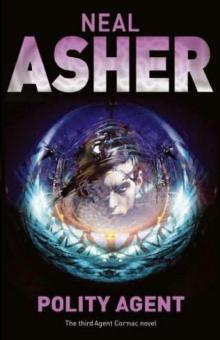 Polity Agent ac-4
Polity Agent ac-4